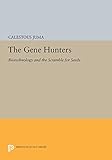The Gene Hunters : Biotechnology and the Scramble for Seeds / Calestous Juma.
Material type: TextSeries: Princeton Legacy Library ; 996Publisher: Princeton, NJ : Princeton University Press, [2014]Copyright date: ©1989Edition: Course BookDescription: 1 online resource (304 p.)Content type:
TextSeries: Princeton Legacy Library ; 996Publisher: Princeton, NJ : Princeton University Press, [2014]Copyright date: ©1989Edition: Course BookDescription: 1 online resource (304 p.)Content type: - 9780691603803
- 9781400860258
- 338.1/6 19
- S494.5.B563
- online - DeGruyter
- Issued also in print.
| Item type | Current library | Call number | URL | Status | Notes | Barcode | |
|---|---|---|---|---|---|---|---|
 eBook
eBook
|
Biblioteca "Angelicum" Pont. Univ. S.Tommaso d'Aquino Nuvola online | online - DeGruyter (Browse shelf(Opens below)) | Online access | Not for loan (Accesso limitato) | Accesso per gli utenti autorizzati / Access for authorized users | (dgr)9781400860258 |
Browsing Biblioteca "Angelicum" Pont. Univ. S.Tommaso d'Aquino shelves, Shelving location: Nuvola online Close shelf browser (Hides shelf browser)

|

|

|

|

|

|

|
||
| online - DeGruyter Benjamin Silliman : A Life in the Young Republic / | online - DeGruyter Whitney M. Young, Jr., and the Struggle for Civil Rights / | online - DeGruyter A Fragile Power : Scientists and the State / | online - DeGruyter The Gene Hunters : Biotechnology and the Scramble for Seeds / | online - DeGruyter The Didactic Muse : Scenes of Instruction in Contemporary American Poetry / | online - DeGruyter Leo Tolstoy : Resident and Stranger / | online - DeGruyter Evolution and Ethics : T.H. Huxley's Evolution and Ethics with New Essays on Its Victorian and Sociobiological Context / |
Frontmatter -- Contents -- Acknowledgements -- Abbreviations -- Glossary -- Introduction -- 1. Genetic Resources and Socio-economic Evolution -- 2. Explorations in Historical Botany -- 3. Genetic Resources and World Agriculture -- 4. Branching Points in Biotechnology -- 5. Life as Intellectual Property -- 6. Germplasm and Kenya's Agriculture: A Case Study -- 7. The Way Ahead: Policy Options for Africa -- Appendix: Institutions Conserving Genetic Resources -- Bibliography -- Index
restricted access online access with authorization star
http://purl.org/coar/access_right/c_16ec
The world is on the verge of receiving new life forms that will profoundly and irrevocably change the global economy: the "gene hunters" who first cloned the gene in 1973 are now not only modifying existing species but also creating new plants and animals. Ready or not for such awesome power, the human race has put itself in a position to govern evolution. What will we do with the abilities we now command? asks this broad and stimulating book on the role of plant material in economic development. Writing in a style that is easily understandable even to those with no background in biotechnology, Calestous Juma begins by showing how the importation of plants strengthened the British Empire and brought the United States to global agricultural superiority. He goes on to explore the current international competition for genetic material and the potential impact of biotechnology on the relationship of the developed and developing world. Juma points out that biotechnology poses real dangers to the third world. Often one of the few exportable resources that a developing country possesses is an unusual or rare crop, but biotechnological techniques make possible the cultivation of many such crops outside their natural habitats, potentially eliminating the need to import the crops from the countries in which they grow indigenously. After discussing the threat of biotechnology, Juma comes full circle and points out that it does not have to be a threat. Actually, tremendous benefits could accrue to the third world from biotechnology--if and only if that new technology is adapted to its needs.Originally published in 1989.The Princeton Legacy Library uses the latest print-on-demand technology to again make available previously out-of-print books from the distinguished backlist of Princeton University Press. These editions preserve the original texts of these important books while presenting them in durable paperback and hardcover editions. The goal of the Princeton Legacy Library is to vastly increase access to the rich scholarly heritage found in the thousands of books published by Princeton University Press since its founding in 1905.
Issued also in print.
Mode of access: Internet via World Wide Web.
In English.
Description based on online resource; title from PDF title page (publisher's Web site, viewed 30. Aug 2021)


